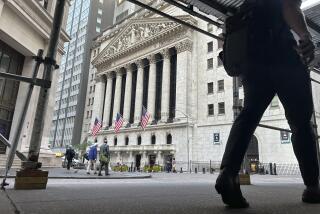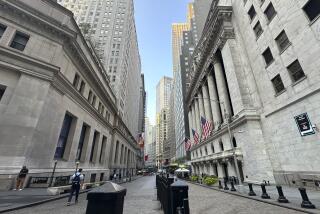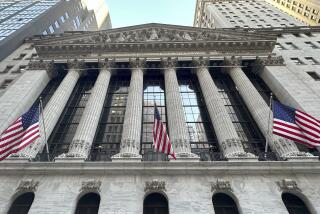Stocks rally as investors cheer economic data
U.S. stocks rallied amid more evidence of a U.S. economic recovery and hopes of a new Greek bailout, sending the Dow Jones industrial average to one of its best days this year.
The Dow rose to within 100 points of the psychologically important mark of 13,000, a level last reached in May 2008.
Economic data released Thursday showed that the number of people filing for unemployment claims fell last week, while the number of homes under construction rose. The reports helped paint a more upbeat picture about the economy that put Wall Street in a buying mood.
The Dow surged 123.13 points, or nearly 1%, to 12,904.08. Just one of the 30 stocks in the average declined. The broader Standard & Poor’s 500 index rose 14.81 points, or 1.1%, to 1,358.04; and the technology-heavy Nasdaq composite jumped 44.02, or 1.5%, to 2,959.85.
“The markets are very susceptible to good news that is occurring,” said A.C. Moore, chief investment strategist for Dunvegan Associates Inc. in Santa Barbara. “Everyone is defensive and hunkered down, so markets give a knee-jerk positive reaction to good news.”
Investors cheered after the Labor Department reported that the number of new unemployment benefit claims last week unexpectedly fell 13,000 from the week before, to 348,000. That is the lowest number since March 2008 and less than the 365,000 expected by economists polled by Bloomberg. It was another sign of growing strength in the labor market; hiring also has shown gains in recent weeks.
Meanwhile, the market was also bolstered by a report indicating that the residential real estate market continues to stabilize. The Commerce Department reported that developers were breaking ground on new homes in January at a faster pace than analysts predicted.
Stocks were also boosted on reports that Europe’s central bank and governments are getting closer on a deal that would help bail out Greece from its debt troubles.
The rally in U.S. stocks followed declines in European markets after Moody’s Investors Service said it was considering a downgrade for some of the world’s biggest banks. The rating company said the big global banks are all dealing with challenges such as widening credit spreads, delicate funding conditions and increased regulatory requirements and restrictions.
Roger Palley, managing director of equity investments at First Foundation Advisors in Irvine, said it was a positive sign that U.S. markets were able to shrug off the Moody’s report. Financial stocks were among the S&P 500’s biggest drivers.
“The market is not going down on bad news like it did four months ago,” he said. “That’s usually a bull market, when bad news doesn’t affect you anymore and the money just comes in. We’ve seen this for a while now.”
The gains in the market were tempered by continuing concerns that the international community will not approve more aid for Greece in meetings next week. In response to the economic problems in Europe, Moody’s put 114 European financial institutions on notice for a possible downgrade. Moody’s said its concern about European banks was due to the “disrupted markets and a deteriorating, uncertain economic outlook” in Europe.
More to Read
Inside the business of entertainment
The Wide Shot brings you news, analysis and insights on everything from streaming wars to production — and what it all means for the future.
You may occasionally receive promotional content from the Los Angeles Times.










